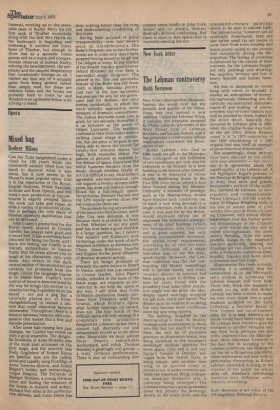Mixed bag
Rodney Milnes
Cosi fan Tutte languished under a cloud for 150 years while the nineteenth century tried (not too hard) to discover what it was about, but it now seems to be Mozart's most popular opera. Cosi is in the repertories of the Royal, English National, Welsh National, Scottish and Kent Operas, and this week's new production at Glyndebourne is eagerly awaited. Since the work can take and repay so wide a variety of production styles, this is perhaps the only piece of blanket repertory duplication that can be defended.
John Copley's production for the Royal, newly revived at Covent Garden, has always been good and it wears well. It has sometimes been criticised for being too funny, and I know the feeling, but Copley is so warmly sympathetic to human frailty that he never allows you to laugh at his characters, only with them. Any titters in the dark central section of the second act are certainly not prompted from the stage; I think the language barrier is to blame here. Copley's iron control of mood is demonstrated by the way he brings this section to a close by having Guglielmo sit on his sword — not just a gag but a carefully placed act of Stimmungsbrechung to release a tension that could otherwise become unbearable. Throughout there is a balance between humour and compassion that makes this a fine and durable presentation.
After some hair-raising late cast changes, the Garden has ended up with a good ensemble. The delightful Dorabella of Anne Howells, one of the most alert actresses on the lyric stage, and the scarcely less lively Guglielmo of Robert Kerns are familiar; new are the calmly acted and capably sung Fiordiligi of Anna Tomowa-Sintow, and Judith Blegen's bolshy and entrancingly vulgar Despina. The Ferrando of RUdiger Wohlers, a young German tenor still finding the measure of the house, is musical and ardent. Richard Van Allen is the authoritative Alfonso, and Colin Davis has done nothing better than his crisp and understanding conducting of this score.
Having been accused of gross irresponsibility over last week's piece on Glyndebourne's The Rake's Progress, one or two further words are in order now that I have stopped forcing myself to laugh lest I be obliged to weep. In the history of the theatre, has any good painter (which Hockney is) ever been a successful stage designer? The answer is no. The one successful feature of the Rake was the front cloth: a static, fabulous picture. Just two of the less successful features are the sets for the graveyard and for Bedlam, the only scenes, incidentally, in which the work actually approaches some measure of dramatic commitment. The Joshua Reynolds tomb joke is good, for ten seconds; thereafter it is as intrusive as the worst of Osbert Lancaster. The madmen confinedin their little boxes make a striking visual image at curtainrise, but the price to be paid in not being able to move the chorus for twenty-five minutes seems too high. Both examples betray the painter of pictures as opposed to the definer of space. Elsewhere the wilful fussiness detracts from the music, though whether fatally or not it is difficult to say. Stravinsky's agreeable neo-neo-classical vein can support a twenty-minute ballet score, but does not contain enough blood for a full-length opera. Nevertheless, Bernard Haitink and the LPO loyally served those few red corpuscles there are. The problem facing any producer of the piece is to find its heart, and if John Cox was defeated, it was because there is probably no heart to find. Whether or not any good poet has ever been a good librettist is a larger question, but I believe that Auden's and Kallman's arch twitterings make the work of such despised scribblers as Helmina von Chezy, James Robinson Planche and Eugene Scribe seem effusions of sheerest dramatic genius.
There are design problems of precisely the same nature in Death in Venice, which has just returned to Covent Garden. John Piper's cloths, unfurled at the back of the black stage, are exquisite as pictures but do not help the opera in any way. I still think that Colin Graham's production fatally confuses Eros Thanatos with Eros, Uranus, which Britten's opera, after further hearings on record, does not. The true worth of this difficult opera will only emerge in a completely new production designed for a theatre rather than a concert hall, discreetly cut and substantially re-cast as to the silent roles. Meanwhile we must admire Peter Pears's remarkable Aschenbach and relish Thomas Hemsley's gloatingly evil genius — a truly virtuoso performance. There is also an outstanding new
counter-tenor Apollo in John York Sinner and, as always, Steuart Bedford's devoted conducting. But there is more to this opera than is currently meeting the eye.


































 Previous page
Previous page